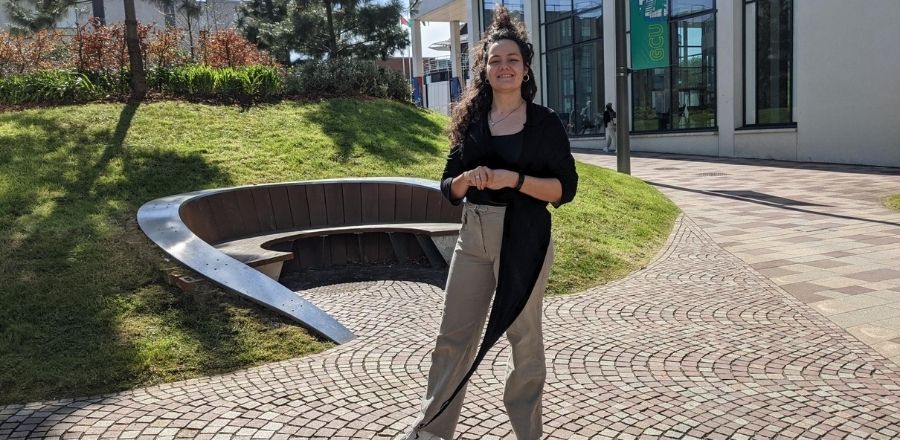Happiness, self-care and socialisation – it’s time we looked at what exercise can give us

A GCU student is encouraging us all to sit less and move more as part of a national campaign.
On Your Feet Britain takes place on Thursday 28 April and aims to unite the UK against sedentary behavior.
With many students currently facing exams and assessments, we wanted to hear about the most effective ways to keep active whilst juggling a busy lifestyle – as well as some general words of encouragement to help us get out and shake off those covid blues.
It’s time to stand up (definitely not sit back!), relax and read on for our feature with Human Nutrition and Dietetics student, Vasiliki Papadopoulou:
So, first of all, just tell us a bit about what sedentary behaviour actually is?
“Sedentary behaviour, very simply, is when you go to the office, sit all day, then get in your car to go home and spend the evening on the couch watching television. It’s definitely been more of an issue recently with the pandemic – we were hardly allowed out our houses!
It’s sometimes difficult to make a change, but our bodies were meant to move and that’s definitely what we need to do more of after the last two years.”
How important is it for us to avoid sedentary behaviour?
“There are some things we need to understand in terms of what it means for us. Our bodies have adaptability, so if you go to work every day and you are lifting things, your body will address this by becoming stronger to help you achieve this. At the same time, when you don’t have the need to do it, your body won’t want to waste unnecessary energy – that’s how our body works. So, as a result, we’re losing metabolic tissue, we’re losing muscle mass, we’re losing bone density. All of this over time can lead to weight gain and subsequent problems. These can range from things like poor posture and join pain, through to mental health issues.”
What role does exercise have to play in all of this?
“Exercise helps us to produce good endorphins, serotonin and dopamine, so it is very important. People tend to think of exercise as “I need to go to the gym” and I do feel that we focus too much on how our body looks, rather than how we actually feel. It has to become something you enjoy doing, whether it be football, volleyball, dancing, or even just a simple walk. That way you don’t focus on what exercise is taking away from you (calories and weight) but instead we focus on what exercise is giving you. The happiness, socialisation and self-care is guaranteed, along with the by-products of fitness and strength.”
What are some simple things that we can do to get moving more?
“We should try to take a break every 30 minutes, especially with office jobs and life as a student where we’re in front of computers. You don’t need to do a full workout, but maybe just try to loosen off your joints and help your circulation. Even doing something like the housework or playing with your dog helps!
It’s also very important to have a good posture when sitting, which is something I really struggle with! Posture problems can lead to other problems because every muscle in our body is connected.
Standing desks and active sitting are also great ideas for those that traditionally sit to work.”
How have you been keeping active recently?
“I’m not the best role model to be honest. It has been difficult for me during covid because I really lost my motivation. I decided that I didn’t want to focus too much on the gym - I wanted to focus more on the social aspect, so I joined the volleyball team at GCU. It was really nice, because it was great fun and the social aspect really helped with my mental health during what was obviously a difficult time.
When I can’t be bothered doing anything too strenuous, I just like to go a nice long walk exploring Glasgow, because I haven’t really had much a chance to do that since moving here. It really helped my sleep – previously my body wasn’t tired enough because there were days where I would do nothing. A thirty-minute walk sounds so small but it changes everything – little things can make a big difference.”
By Ross Clark
Got an SHLS or GSBS story? Email me at Ross.Clark@gcu.ac.uk or message me on Twitter
